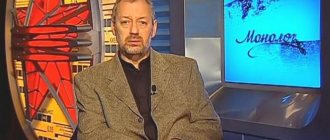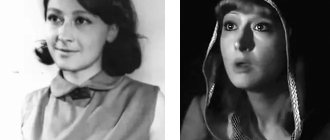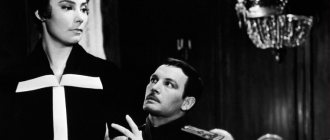Biography
Tatyana Nikitichna Tolstaya is a writer, TV presenter of the intellectual program “School of Scandal,” author of the novel “Kys.”
Tatyana was born in St. Petersburg (Leningrad) in May 1951. The writer's family is as colorful and unusual as Tatiana. My maternal grandfather is the famous literary translator Mikhail Lozinsky, poet. My paternal grandfather is the famous writer Alexei Tolstoy, who created the unforgettable “The Golden Key, or the Adventures of Pinocchio” and “The Hyperboloid of Engineer Garin.” Tolstoy's wife, Tatiana Nikitichna's grandmother, poetess Natalia Krandievskaya.
Writer Tatyana Tolstaya
Tatyana Tolstoy’s father also achieved success, who went not along the literary, but along the scientific line and became a professor of physics.
The house in which the future writer was born was always noisy and fun. After all, the Tolstoys had 7 sons and daughters. Later, Tatiana's sister Natalya also became a writer and teacher of the Swedish language. Brother Ivan also became interested in philology and the history of the Cold War period, whose statements can be heard on Radio Liberty. Brother Mikhail devoted himself to the natural sciences and, in addition to physics, later turned his attention to political science.

Fekla, Peter and Tatyana Tolstoy are relatives
As a child, Tatyana became interested in reading. After graduating from school, the girl went to enter Leningrad University, choosing classical philology. Here Tolstaya studied literature and two languages - Latin and Greek.
After graduating from university in 1974, the future writer and TV presenter moved to the capital with her husband, classical philologist Andrei Lebedev.
To the pinnacle of success
1983 was the year her literary career began.
The story “They Sat on the Golden Porch...” was published on the pages of Aurora magazine, which was recognized as the most successful literary debut of the year. Literary critics and readers warmly accepted the writer’s prose, and all over Russia they began to discuss the new name in literature. Soon her other stories were also successful:
- "Sonya."
- “If you love it, you don’t love it.”
- "Clean Slate" and others.
In just 5 years, Tatyana Tolstaya published more than 20 stories, which were then included in a collection named the same as her debut story - “They were sitting on the golden porch...”.
However, there were those who spoke not very positively about the collection. The writer was accused of the “density” of the plots of her stories, excessive stereotypes and too deep analysis and synthesis characteristic of her works. Despite this, Tolstaya was accepted into the Writers' Union of the Soviet Union.
Tatyana Nikitichna's works have been repeatedly awarded prizes and awards. The circle of its readers expanded every year, and the name of a new person in literature began to be discussed more often.
We recommend: Vera Inber: life path
At the end of the 80s, Tatyana Tolstaya decided to go abroad, where she was invited to give lectures on Russian literature. While working in college in the United States, the writer began to discover more possibilities, get to know people more deeply, and gain more practical experience.
Until the end of the 20th century, Tatyana worked at foreign universities, where at that time interest in the study of language and literature increased. It was then that Tolstaya began to hear and analyze the “hybridity” of Russian words and evaluate the possibility of translating them into a foreign language.
But Tolstaya did not forget about Russia. Living abroad, she periodically sent her works (articles, essays, reviews) to Moscow, where she was published in the Moscow News newspaper. She even had her own column. At the same time, the writer was translating her own stories, thanks to which she began to gain worldwide fame.
In the early 2000s, Tatyana Nikitichna returned to Moscow and began working as a journalist and teacher at the university. From that time on, her books began to be published with success. A total of 14 books have been published so far. Among them:
- "Day. Personal" (2007).
- "Sisters" (1998).
- "Kys" (2001).
- "Light Worlds" (2014).
- “Felt Age” (2015) and others.
In her work, the writer always chose universal themes of evil and good, death and life, relations between generations. Over time, the heroes of her works became more diverse and deep. So, you can meet crazy grandmothers, mentally disabled people, and people who find themselves in difficult, inhumane conditions.
Books and television
In the capital, a writer from St. Petersburg gets a job as a proofreader in the editorial office of the Nauka publishing house. Here began the literary biography of Tatyana Tolstoy. The writer’s debut is the critical article “Glue and Scissors...”, published in the journal Voprosy Literatury in 1983.
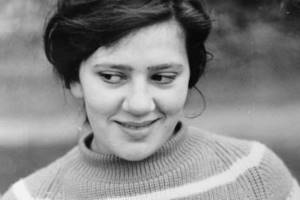
Tatiana Tolstaya in her youth
As Tatyana Nikitichna later shared, a banal circumstance forced the girl to take up the pen herself, and not just read and review other people’s works. After the operation on her eyes, Tatyana had to lie with a bandage for a month. Out of idleness, in order to pass the time, Tatyana Nikitichna began to compose texts. This is how the first plots of the future works of the writer Tolstoy were born.
Having removed the bandage, Tatyana Tolstaya immediately began to transfer her fantasies to paper. Thus was born the debut story, published in the popular magazine “Aurora” under the title “They were sitting on the golden porch...”. The story was immediately recognized as the best literary debut of the 1980s. Inspired by success, Tolstaya wrote another two dozen stories, which were published from 1984 to 1988 - “Date with a Bird”, “Sonya”, “Blank Slate”, “If You Love It, You Don’t Love It”, “Okkervil River”, "Mammoth Hunt" and others. These works were readily accepted by fashionable “thick” magazines – “New World”, “Znamya” and “October”.
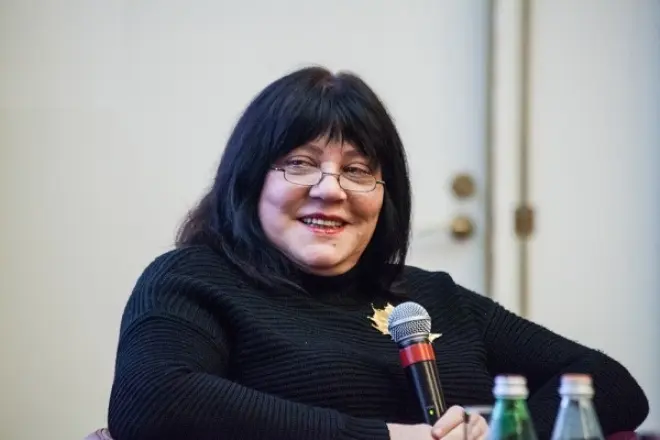
Tatiana Tolstaya
The first collection of stories by the St. Petersburg writer received the same name as the first story. Admirers of Tatyana Nikitichna's talent were able to purchase the book in 1987.
Soon after the publication of the collection, Tatyana Tolstaya was accepted into the Union of Writers of the USSR. But Soviet criticism reacted rather coldly to the works of the new member of the Writers' Union. The young writer was reproached for his “thick” writing, cleverness and stereotyped works.
Nevertheless, the number of fans of Tatyana Tolstoy’s work grew rapidly. A young author with a sharp mind and an original point of view, not afraid of harshness and catchy colors, Tolstaya quickly burst into the modern literary community. The writer is known as an intellectual and even a rebel. The heroes of the works are unexpected characters - old-fashioned old women, disabled children, city madmen and homeless people. The philistinism and consumer psychology of modern society are especially harshly ridiculed.
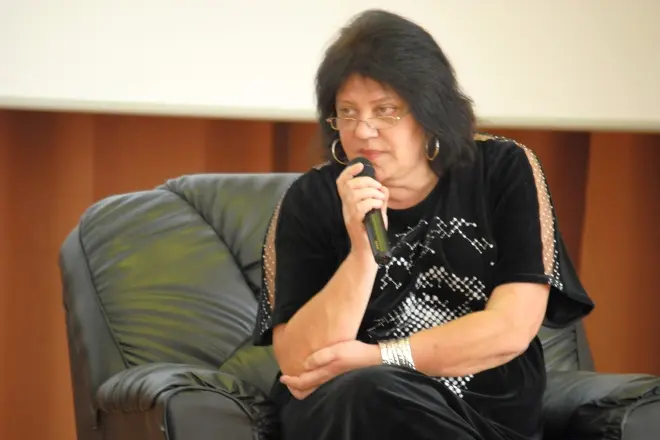
Writer Tatyana Tolstaya
In 1989, Tatyana Tolstaya was accepted into the Russian PEN Center. And the next year the writer went to the USA, where she was offered to teach Russian literature and writing at one of the colleges located in Princeton. During this period, Tolstaya collaborated with famous magazines, including The New Yorker and TLS.
Throughout the 1990s, Tatyana Nikitichna regularly visited America, where she gave lectures at various universities. Tolstaya lived in the USA for several months and soon noticed that, under the influence of the environment, the language of emigrants was filled with “underwords,” some ugly hybrids of several languages. The witty writer was able to depict this phenomenon in detail in the essay “Hope and Support.”
In the 90s, Tatyana did not forget her homeland, where in the weekly Moscow News the writer was given her own column called “Own Bell Tower.” In the magazine "Capital" Tolstaya served as editor. The writer's articles also appeared in the Russian Telegraph publication. Abroad, Tatyana Tolstaya began creating translations of her own works, thanks to which she gained worldwide literary fame. In 1998, together with her sister Natalya Tolstoy, she published the book “Sisters”.
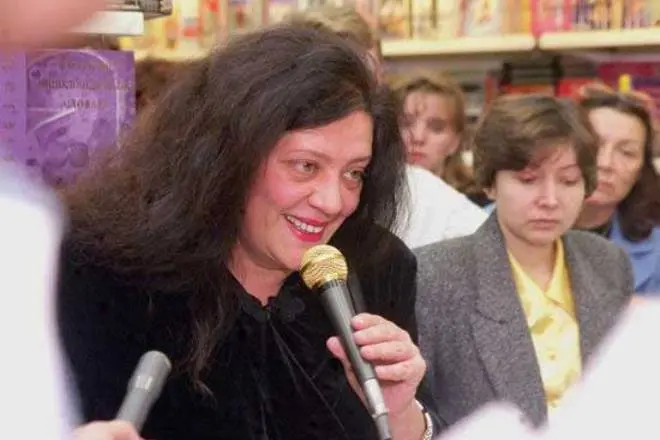
Tatyana Tolstaya at the presentation of her book “Sisters”
In Russia, where the writer finally returned in 1999, Tatyana Tolstaya returned to journalism and teaching.
In 2000, Tatyana Tolstaya’s first novel, entitled “Kys,” appeared. The work was met with mixed reactions, but gained many fans. The book was about Russia, which survived a nuclear explosion, after which the intellectual abilities of the population sharply decreased. Primitive instincts replaced human standards of morality and ethics. In a novel created without a single positive character, every line is laced with sarcasm. The novel brought the creator the Triumph Award and soon became a bestseller. The plot has repeatedly become the basis for stage productions, including radio plays.
And the following year, three more books by Tolstoy were published: collections of stories “Day”, “Night” and “Two”, the circulation of which amounted to 200 thousand copies. In the same year, the writer was awarded the XIV Moscow International Book Fair prize in the “Prose” category.

Tatyana Tolstaya in the show “Minute of Fame”
Since 2002, Tatyana Nikitichna Tolstaya has appeared on the screen. First in the program “Basic Instinct”, and then in “School of Scandal”. She hosted her last talk show together with Avdotya Smirnova. The program became a favorite for many intellectuals and brought the presenters the TEFI award. Later, Tolstaya appeared in another show called “Minute of Fame.”
In the early 2000s, Tatyana Tolstoy’s bibliography was replenished with works “Raisin”, “Circle”, “White Walls”, “Women’s Day”, “Not Kys”, “River”. In 2010, Tolstaya, together with her niece Olga Prokhorova, published the first book for children, which was called “The Same ABC of Pinocchio.” There is a connection here with the famous work of Tatyana Nikitichna’s grandfather “The Golden Key, or the Adventures of Pinocchio.”
In 2010, the writer was awarded a number of international awards. Two years later, the radio station “Echo of Moscow” and the magazine “Ogonyok” placed the writer’s name on the list of “One Hundred Most Influential Women in Russia.” In 2014, after the release of the stories “On a Low Fire”, “The Invisible Maiden”, “Light Worlds”, Tatyana Tolstaya became the winner of the Belkin Literary Prize. A year later, the writer pleased her fans with the collections “Felt Age” and “Girl in Bloom.”
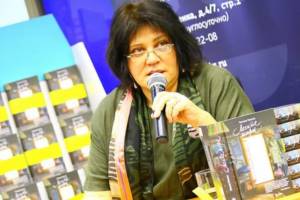
Tatyana Tolstaya at the presentation of her book “Light Worlds”
Another talent of Tatyana Tolstoy is cooking. The writer has a large baggage of recipes for preparing dishes of European and Russian cuisine. The writer posts descriptions of the preparation of pies, salads, and cakes on her own Facebook page and blog. Tatyana accompanies recipe descriptions with colorful photos that increase the viewing of accounts by network users.
Memoria. Tatiana Tolstaya
Tatyana Tolstaya, writer and TV presenter, was born on May 3, 1951.
Tatyana Nikitichna Tolstaya (65 years old) was born in Leningrad into a large family of physics professor Nikita Alekseevich Tolstoy (she had six brothers and sisters). Maternal grandfather is the famous translator Mikhail Lozinsky. On her paternal side, she is the granddaughter of the writer Alexei Nikolaevich Tolstoy and the poetess Natalia Krandievskaya.
After graduating from school, Tatyana entered Leningrad University in the department of classical philology, where she graduated in 1974. In the same year, she married classical philologist Andrei Lebedev, with whom she moved to Moscow. She worked as a proofreader for the Main Editorial Office of Oriental Literature at the Nauka Publishing House.
Literary activity began in 1983: the writer underwent eye surgery, after which she had, in her words, “to lie with a bandage for a whole month.” “And since it was impossible to read, the plots of the first stories began to appear in my head,” Tolstaya recalled. In the same year, Voprosy Literatury published a critical article, “With Glue and Scissors...”, and in Aurora, the story “They Sat on the Golden Porch...”, recognized as one of the best literary debuts. This was followed by publications in Novy Mir and other thick magazines; in 1987, published and new works were combined into a collection named after the debut story. After its publication, Tolstaya became a member of the Union of Writers of the USSR, and since 1989 - the Russian PEN Center.
In 1990, Tolstaya left for the United States, where she taught Russian literature and creative writing at Skidmore College in Saratoga Springs and Princeton, and collaborated with the New York Review of Books, The New Yorker and other magazines. Throughout the 1990s, the writer spent several months a year in America. At the same time, constant journalistic activity in Russia began: Tolstaya wrote the column “Own Bell Tower” in “Moscow News”, was a member of the editorial board of the magazine “Stolitsa”, wrote for “Russian Telegraph”. In 1998, she became a member of the editorial board of the American magazine Counterpoint. During these same years, the books “If you love, you don’t” (1997), “Okkervil River” (1999) were published, and in 1998, co-authored with sister Natalya Tolstoy, the book “Sisters” was published.
In 1999, Tatyana Tolstaya returned to Russia.
Here, two years later, “Triumph” was waiting for her - the prestigious prize was awarded for the novel “Kys” published in 2000. The post-apocalyptic dystopia, written in fantastic language, without exaggeration, became the literary event of the year.
At the same time, she first appeared on television - in the program “Basic Instinct”. In the same year, she became a co-host (together with Avdotya Smirnova) of the TV show “School of Scandal” on “Culture”. In 2003, Tolstaya and Smirnova received the TEFI Award in the “Best Talk Show” category. From 2004 to 2014, the program aired on NTV. At first, it fully lived up to its name and guests in the studio often had a hard time; over time, openly sympathetic people began to appear in the program (writer Dmitry Gorchev, tour guide Tatyana May and others), and the tone of the program noticeably decreased - now it was often just a conversation “for life.”
In 2010, in collaboration with her niece Olga Prokhorova, the writer published the children's book “The Same ABC of Pinocchio.” In the ranking of the best books of the XXIII Moscow International Book Fair, the book took second place in the “Children’s Literature” section.
What is she famous for?
Photo from personal archive
In the 80s, Tolstaya became known for her original dense, “thick” language. Some critics even complained that “you can’t read too much at once.” The characters in her prose were “quiet outcasts” - elderly people, unrecognized poets, city madmen. The 2000s brought Tolstoy fame as one of the country's brightest and smartest TV presenters.
What you need to know
Tolstaya is an active Internet activist and blogs on LiveJournal and on Facebook. She is a bright polemicist (and, according to some, a “fat troll”), who knows how to nail her opponent with one comment (it is worth noting that for this she does not use obscene language, which she skillfully and effectively uses in other cases). A long-standing “female friendship” connects Tolstoy with the secular columnist Bozhena Rynskaya: the story began in 2010, when the latter declared the need to firmly put in place people who want to sit on their necks. Then Tolstaya reminded her of an episode in which Rynska behaved in exactly the manner described.
The matter did not end there: recently Rynska announced her desire to sprinkle rat poison on the children making noise under the windows, to which she received a short response: “God, you’re a nit.”
Direct speech
About vox populi: “The only space, the only free place where you can – if you’re lucky – listen to the people’s voice and genuineness is a trolleybus. <…> If you ride a trolleybus more often - and no matter on what route, and no matter with what passengers - you can get a fairly clear picture of the people's worldview, since the people are more or less the same throughout the breadth and depth, and the mythopoetic beginning there is something fresh and healthy in him, like under King Pea, and it pulsates just as much, and it’s just as stubborn, and you won’t argue with it, and you won’t grab it, and you won’t eradicate it, and no justice has anything to do with it, and no human rights have nothing to do with it, and you won’t show us, and you won’t catch up with us, and you won’t defeat us.”
On doing nothing (in connection with eye surgery): “Everything I needed to know about literature, about how to create it, was revealed to me in one fine moment. And I attribute this to forced meditation, the meaning of which is to throw out all the garbage that has accumulated in my head and soul. Doing nothing for a long time (unless, of course, you are depressed) promotes new discoveries - in this sense, everyone has a chance to change.”
About the USA: “America doesn’t infuriate me - it’s, let’s say, just annoying. It is very difficult to discuss global historiosophical issues with people who did not know the horror and grief that occurred on our territory. The people there did not look into this abyss. One of my acquaintances was very sympathetic - when I told him about Shalamov’s life, he agreed: “Yes, yes, as I understand it! We had McCarthyism in the fifties, everyone was suspected of communism, it was so hard!” And I told him: “Aren’t you ashamed? Here, millions died in Kolyma, and you have McCarthyism!” “Well, a lot of people were fired from our universities,” he answers. But here, I say, everyone was shot.”
About Crimea: “I have my own special relationship with Crimea, because I was conceived in Crimea. If they asked me: “Is Crimea yours or Crimea ours?”, I would answer: “Crimea is mine!” If there were no Crimea, there would be no me. And everyone else has come in large numbers. Everyone: both Russians and Ukrainians. Except me."
About raising children: “At one time it turned out so well that when my children were small, our TV broke and we decided not to buy a new one. It was very good: the children watched filmstrips. And it was just as interesting as cartoons, but we spent time together watching filmstrips, I read aloud to them, they could ask me to repeat something. This leisure time was more rustic, perhaps, and more enjoyable than sitting in front of the TV. Nowadays it’s more difficult to pull this off: the apartment has eight TVs and the Internet, and there’s nothing else, and everything seems to be there. How to stop children from surfing the Internet? No way! We need to dose up the Internet. And you should try to read to your child. Read, read, read – so that children don’t wean themselves from reading.”
On arranging life: “At a minimum, a person always has the opportunity to create a clean circle around himself, a clean spot of existence: not to crap around himself, not to treat people the way he would not like to be treated, to improve his life and the life of his families. There is no need to pull society to some shining heights, because it is impossible. We must go another way, a quiet one. Through enlightenment."
About the novel “Kys”: “This was an attempt to literary describe the society living in this paradigm with its special logic, disregard for the ideas of equality, nepotism, nepotism. As long as all this continues, nothing much will change in Russia. Although now we can see the erosion of this paradigm, despite our differences with the West, we still have the Internet, which opens us to the world, and the world to us.”
About “School of Scandal”: “I was preparing for the program, so I knew who I would offend, whether I would feel sorry for him or not. It wasn't like anyone suddenly burst into tears. Of course, it happened that they were offended completely in vain. Although all the guests knew perfectly well what awaited them at the “School of Scandal,” and it was their choice - to come or not to come.”
Sasha Sokolov about Tatyana Tolstoy: “I like her essays the most. Very poignant. There are some good stories. I think she will remain in the history of Russian literature precisely for her essays. She has grown tremendously over the last 15 years.”
6 facts about Tatyana Tolstoy
- The writer’s work has repeatedly become the object of scientific research, including such “heavyweights” as Mark Lipovetsky, Pyotr Weil and Alexander Genis
- The eldest son of Tatyana Tolstoy is the famous designer Artemy Lebedev, the youngest is the photographer Alexey Lebedev (lives in the USA)
- Several performances were staged based on the novel “Kys”, and in 2001 a literary series was broadcast on Radio Russia
- In 2002, Tolstaya headed the editorial board of the short-lived newspaper Konservator.
- Tolstaya, together with Alexander Maslyakov, has been a permanent member of the jury of the TV project “Minute of Glory” on Channel One since 2007 (seasons 1–3)
- Together with Boris Grebenshchikov, he is the author of the word “sorrower” (which became the name of one of BG’s songs) - a translation into Russian of the English blues
Materials about Tatyana Tolstoy
Tatyana Tolstaya: “I make many people angry”
Tatyana Tolstaya: It was scary to start writing with my pedigree
Tatiana Tolstaya in the Moshkov Library
Article about Tatyana Tolstoy on Wikipedia
Personal life
As a smart and intelligent person, Tatyana Nikitichna does not discuss private life and does not expose details to public consideration. It is known that Tatyana’s personal life is her sons Artemy Lebedev and Alexey Lebedev, who were born from a marriage with Andrei Lebedev, a descendant of the famous military leader.
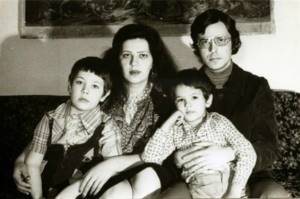
Tatyana Tolstaya and Andrei Lebedev with their sons
Artemy is a talented designer who has his own studio, where Lebedev provides artistic direction.
Tatyana Tolstoy’s youngest son, Alexey, is a photographer, lives in America and works in computer graphics and architecture.
